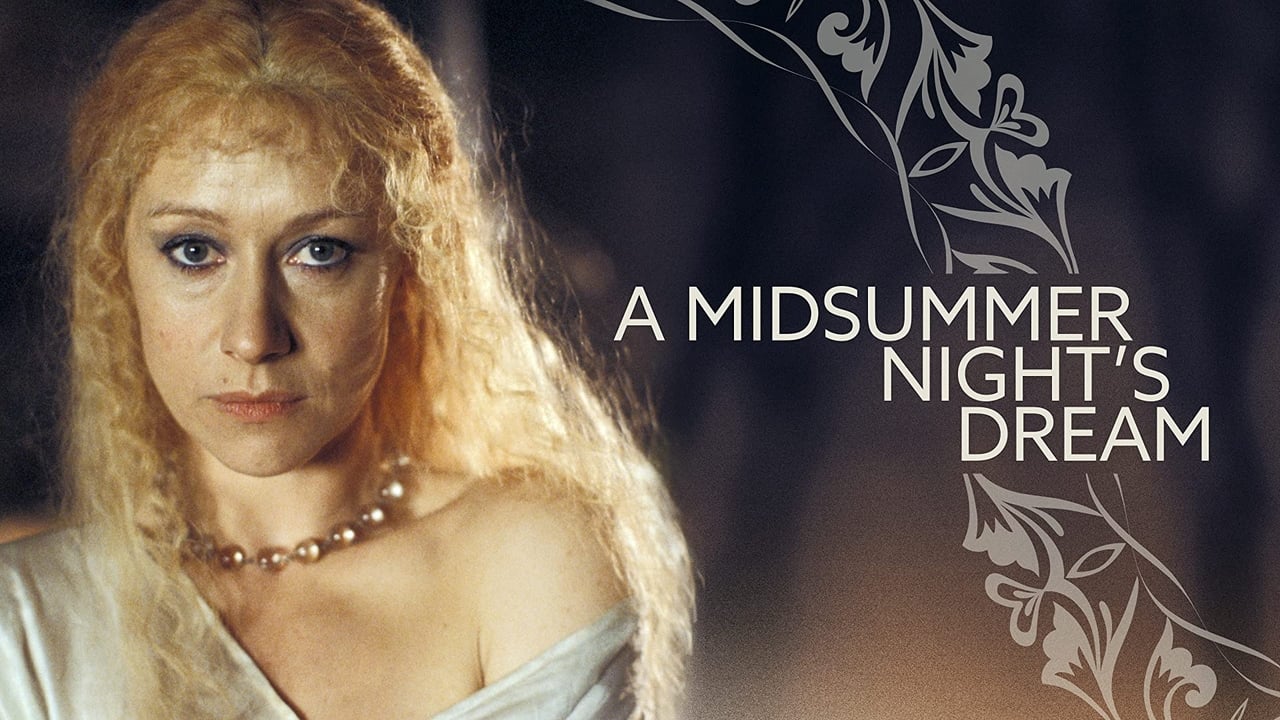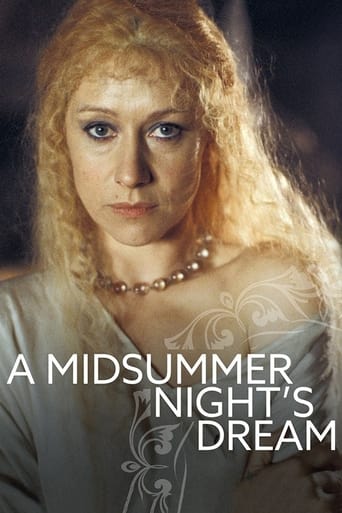

One of the worst movies I've ever seen
... View MoreA Masterpiece!
... View MoreThis is a gorgeous movie made by a gorgeous spirit.
... View MoreA terrific literary drama and character piece that shows how the process of creating art can be seen differently by those doing it and those looking at it from the outside.
... View MoreThis play is magic in Shakespeare because it deals with fairies and other supernatural magical beings, which was slightly difficult in those days under Queen Elizabeth I, though she had gotten rid of and had alleviated the worst legislation against witches and other follies of that type that her father Henry VIII and her sister Mary I had instated. That explains the great carefulness with which Shakespeare introduces these fairies and other Puck and Company. Yet he makes the reconciliation of Oberon and Titania, King and Queen of that underworld one of the four couples that get united or in that case re-united at the end of the play.This gives away the essential architecture of the play. It is a total hymn to marriage and Hymen, an unspecified God that appears at the end of As You Like It to bless four marriages there too, could have come and paid a visit. But no Hymen here since one of the four couples is supernatural. But the architecture is there and at the same time three human couples and something must be awry since we are in Shakespeare and three is the signal of trouble, and here trouble is expressed in two ways. The play in the play couple of lovers, Thisbe and Pyramus, that are doomed to die in the good old Romeo and Juliet style: Pyramus believing Thisbe is dead and killing himself and then Thisbe coming by finds Pyramus dead so she kills herself in her turn.And of course it is the epilogue by Puck announcing that during the night the real world is taken over from under the carpets and under the table by the supernatural underworld. Something is really awry in this simple real world when we are sleeping.But that would not make a good play by Shakespeare. He adds a lot more and particularly one elopement that will not succeed but will not be needed any more on the following day. A full night in the forest for two couples, two young men and two young women who are at the center of the plot. And Puck will play or tinker about with charms and philters and create havoc with the two men loving the same woman who was rejected by both at the beginning. But Oberon will sort things out and solve the human problem of the forced marriage that the father of one of the girls wanted to impose.Note here that we are one century before Molière under Louis XIV in France deals with the same subject in some of his plays at the end of the 17th century. England has always been ahead of times.Puck will definitely create worse havoc with the craftsmen who want to be actors and the poor Nick Bottom, a name Puck mixes with asshole, or rather just ass, two meanings intended, Puck turns that poor Nick Bottom into an ass, one meaning, that of donkey, intended here, and Titania falls in love with that ass she sees when she opens her eyes. That's a change since she was infatuated with a young, very young indeed Indian boy before. Who spoke of Pedrophilia? Could that one repeat because I did not get it very clearly.It will take more charms and philters from Oberon to sort that mess out and all will be end that ends well.The last remark we can make is about the play in the play, a trick often used by Shakespeare in tragedies as well as in comedies, generally to create a hiatus between reality and fiction that reveals reality, some hidden secret dark side of reality, like in Hamlet. The French and the snobs in Los Angeles and Hollywood would say it is a "mise en abîme", which is a metaphor for that confrontation of two elements that reveal a third one deep under the surface. Here it is a tragic love affair that is caused by the simple existence of a wall between the two lovers and in fact it reveals to Theseus and Hyppolita that their marriage is the only sane solution to clear up the horizon of Athens and the Amazons and establish some peace, or at least one little piece of peace in that ancient Greece.As if things had not changed a lot concerning that country. They are living on credit and sooner or later their credit card is forfeited and they start getting up in arms, as if it were going to change anything. Better get settled in good husbandry and a stable economical if not niggardly marital situation and try to live with the means you have and not the means other people have more or less on your request.Shakespeare made it a comedy, but apparently the two dead ones are actors, hence fake, but the pregnant woman who got burned to death in Athens was not a pregnant actress. I am telling you these Mediterraneans! Dr Jacques COULARDEAU
... View MoreEasily Shakespeare's most accessible play, with fairies, lovers and comical buffoons, "A Midsummer Night's Dream" is given a decent enough rendering here. The play could have been paced better, and some scenes made funnier but on the whole the production is acceptable.The Duke of Athens Theseus (Nigel Davenport) is preparing to marry his bride Hippolyta (Estelle Kohler) but has problems with two noblemen, Lysander (Robert Lindsay) and Demetrius (Nicky Henson), fighting over the same woman, Hermia (Pippa Guard). A fourth woman Helena (Cherith Mellor) hankers after Demetrius but he's not interested. A troupe of amateur actors, including the demented Bottom (Brian Glover) rehearse a play for the Duke's wedding. Hermia flees with Lysander into the forest pursued by Demetrius and Helena where Oberon (Peter McEnery), king of the fairies, takes an interest in their affairs in between squabbling with his Queen Titania (Helen Mirren). With the aid of his trusty sidekick Puck (Phil Daniels), he attempts to resolve the lovers' dispute himself and in the meantime embarrass Titania by having her fall in love with Bottom...At it's base this an actually quite complicated plot but the genius of the writing is that it's very easy to follow. The production does the play proud in this aspect and there's never any problem understanding what's going on.The lover's fighting in the forest benefits from the use of overlapping dialogue, and there is some lovely choral work to complement the fairy scenes. The beginning and end scenes in Athen's court could have been directed with a little more urgency. As it is, they drag somewhat.Phil Daniel's Puck, however, is too sped up. He is lithe and physical but too much of his dialogue is unfathomable. The scenes with the mechanicals could have been played for more laughs, despite the best efforts of Glover and Geoffrey Palmer as Quince.The lovers are well portrayed, and their fickleness as they fall in and out of love with one another is given a nice comic edge by the actors. I feel for the actors, though, as they spend most of their scenes drenched in mud and/or water, not a bad achievement in the studio setting.This series really needs a proper modern dress update these days. There is so much power and relevance in Shakespeare's stories that this project, though well-intended, didn't always take advantage of.
... View MoreThere are two reasons why you might want to watch this version of Midsummer Night's Dream. One is Helen Mirren. She is lovely and perfect as Titania throughout and her delivery of the long monologue to Oberon in Act 2 Sc. 1 does not lose the viewer's attention for a moment. That is an awesome feat considering what a difficult passage it is.The other shining moment occurs in Act 3 Sc. 2, starting about when Demetrius wakes up to find that he is in love with Helena. The ensuing lines are delivered over top of each other, as the lovers engage in a confused quarrel. The actors add to this by pushing each other, trying to get around or over or under to talk to someone other than the one that's talking to them. Great directing and perfect timing make this scene race by like I've never seen it before.These two shining moments hardly make up for the rest of the performance which lacks sparkle. Some parts are sung (Puck's "Jack shall have Jill" speech) which is just incongruous. Perhaps the fact that Starveling sings his part as Moonshine is a bit of self-satire.Which brings me to the rude mechanicals who are particularly lacklustre. Geoffrey Palmer is absolutely wasted here. "Pyramus and Thisbe" is absolutely boring. There are exactly two bits of comic business (Bottom steals food from the wedding table on the line "'Deceiving me' is Thisbe's cue" and Starveling as Moonshine tries to upstage Bottom by hanging the lantern in front of his face) and they aren't exactly hilarious. If it's not funny, it should at least be moving, but although Flute (a very feminine Flute) tries, the director has cut most of the wedding party's backchat and they seem to have little interest in what is going on on the stage. Small wonder really.There's nothing about the sets and costumes, which suggest the English Civil War, to get us excited. The entire first scene is set in a library against a background of a ticking clock. What a great way to remind us how slowly the scene is moving!
... View MoreThis little viewed BBC event is certainly worth watching if you're a Shakespeare fan. I certainly am and A Midsummer's Night Dream (or, as us buffs call it, "The Dream") is certainly one of my favorites. Most of the cast will be not well known to those outside of the ranks of the fans of British theatre and indeed, Helen Mirren, always a delight, may well be the only name that stands out.There have been many versions of this play presented in both as films to be shown in theaters and as films made-for-TV. The rewarding feature of British theater is that seemingly, no matter what the venue for showing the performance, the acting is nearly always up to the highest mark of stage standards.There is no DVD or Video of which I am aware but, if this little romp crosses your screen, be sure to check it out. It's delightful and fun.
... View More